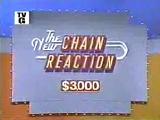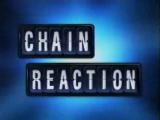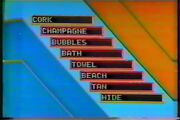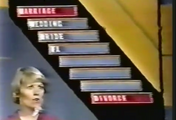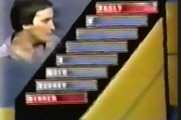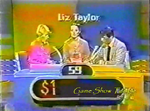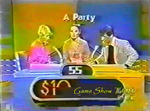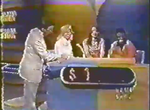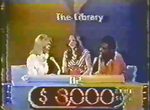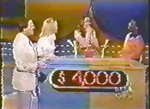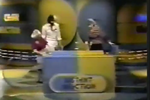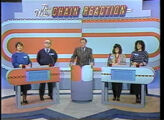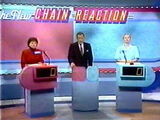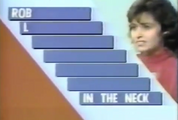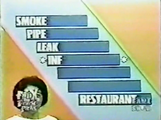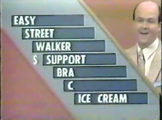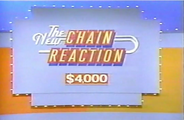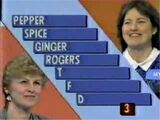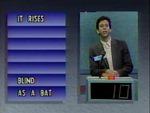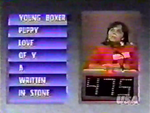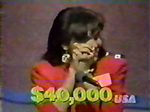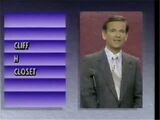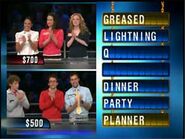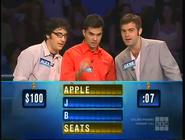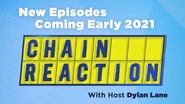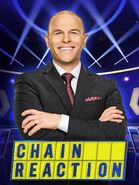| Hosts | |
| Bill Cullen (1979–1980) Geoff Edwards (1980 {sub}, 1986–1991) Blake Emmons (1986) Tim Vincent (2006 Pilots) Dylan Lane (2006–2007, 2021-2022) Michael Catherwood (2015–2016) | |
| Announcers | |
| Johnny Gilbert (1979–1980) Rod Charlebois (1986–1991) | |
| Broadcast | |
| Pilot: 10/28/1979NBC Daytime: 1/14/1980 – 6/20/1980USA (Daily): 9/29/1986 – 6/28/1991 (with repeats through 12/27/1991)GSN Pilots: 3/29/2006GSN: 8/1/2006 – 6/9/2007GSN: 7/16/2015 – 1/29/2016GSN: 2/22/2021 – 6/20/2022 | |
| Packagers | |
| Bob Stewart Productions (1979–1980, 1986-1987) Bob Stewart-Sande Stewart Productions (1987–1991) Global Television Network (1986–1991) Champlain Productions, Inc. (1986-1991) USA Network (1986-1991) Embassy Row (2006–2007) Sony Pictures Television (2006–2007, 2015–2016, 2021) | |
"Chain Reaction, where one word leads to another, and the right word leads to thousands of dollars."
On Chain Reaction, contestants tried to connect words that form a multi-word chain.
Gameplay (NBC Version)[]
In this version, two teams of three (consisting of two celebrities and one contestant) competed to guess words that connect to each other above and below in some way. All the connected words make up a chain.
Main Game[]
The chain consisted of eight words or phrases. The top & bottom words were revealed at the start. The player on the team in control chose which position to reveal a letter (either above the previously revealed word or below the previously revealed word). When the letter was revealed, the player had five seconds to guess the word. The last letter of each word was not revealed; when that happened, each player would get one last shot at it. Should the player on the team in control say the form of the word, the guesser had one last chance to say the exact word.
A correct answer kept control of the chain, but an incorrect word or not being able to guess passed control to the opposing team. Each correct answer also earned points according to how many letters were in the word, if the word was marked with the plus sign ("+"), the value of the word was worth double. The chain continued until one team reached 50 points, or if the chain was completed. When the latter happened (and it usually did, mostly on the first chain), another chain was played. The first team to reach 50 points won the game, $250 to the contestant, and the right to play Instant Reaction for $10,000. The losing player won $5 a point.
Pilot Rules[]
The game was pretty much the same except for the following:
- Married couples played with a single celebrity partner. One spouse played one chain and the other played another.
- The chain board turned around to reveal another chain but in the other direction.
- The word boxes were backlit boxes instead of digital displays. Plus, the top & bottom slots were red while the rest were blue.
- Instead of plus signs ("+"), the last word (the one remaining unsolved word) was the double scoring word. This format would later be used in the 1986 revival.
- Losing couples won their final score in dollars plus a parting gift.
Instant Reaction[]
The Instant Reaction bonus game went through three versions plus one from the pilot, but they were all played the same way, and offered a grand prize of $10,000 to the championship contestant.
In the bonus round, the two celebrities from the winning team were shown a word, a phrase, or a name on their secret screens; their job was to get the contestant to say the answer by constructing a question. The catch was that they had to make that question by adding one word at a time. Giving more than one word, uttering part of the answer or conveying the essence of the answer disqualified it. To finish the question, one of the celebrities had to hit a bell in front of them, allowing the contestant to come up with an answer. Each correct answer brought the winning contestant closer to the big money, and completing the round within a time limit won the grand prize.
The idea of constructing questions using one word at a time was used once before in a failed pilot called Get Rich Quick!. Later, this idea became its own game show called Go.
Version #1[]
The winning team started with one dollar, and had 60 seconds to win $10,000. Each correct answer added a half-zero to the pot; so two correct answers was worth $10, four was worth $100, six was worth $1,000, and eight correct answers won the $10,000.
This version lasted just the first week, even after a very funny first bonus game where only $10 was won.
Version #2[]
The winning team now had 90 seconds to win $10,000, but the winning contestant could only receive the dollar if he/she could say the first correct answer. This time, after that, each correct answer added a full zero to the pot and after the fourth right answer, each answer was now worth $1,000 until they reached $5,000. And then the final answer was worth $10,000.
This version was blamed for having the contestants win too much money. So they scrapped it in favor of one more version.
Version #3[]
This version was a simple one, for each correct answer was worth $100, and getting 10 answers in 90 seconds or less won $10,000. Later the $250 prize for winning the game was discontinued and the $5/point for losing players was changed to consolation prizes. (In one episode, a losing contestant won $500 with the parting gifts by spotting an audience member saying one of the answers.) Because of this, the winning team was given $100 to start with each correct answer being worth $100 more. So nine correct answers in 90 seconds was required to win the $10,000 grand prize.
Pilot Version[]
In the pilot, instead of playing for $10,000, the winning team (consisting of one celebrity and a married couple) played for $100,000. They had 60 seconds to win it.
They started at one penny, and each correct answer moved the one off to the left meaning that the first two correct answers were worth a dime (ten cents) and one dollar respectively. The next five correct answers added a zero to the stake, so a total of seven correct answers was needed to win the $100,000 grand prize.
Returning Champions[]
In the series, contestants could remain as champions for 10 matches. The champion limit for the pilot is unknown.
Gameplay (USA/Canadian Version)[]
In this version, the celebrities were dropped, and the show now featured two civilian contestants on each team. In each chain, one member of each team was the giver, and the other was the guesser. Points were no longer determined by the length of the word.
Also in the beginning, a live wall was used for the chain with the letters superimposed. Later the chain board became a computer graphic. Also at first it maintained the diagonal look from the original. Later the chain board became vertical.
Main Game[]
The chains now consisted of seven words with the top & bottom words still given at the outset. The giver of the team in control could choose to give a letter over or under the previous word to his/her partner or the opposing guesser. Either way, the letter was revealed (unless it was the last letter, meaning that the letter would stay unrevealed) and the player in control of the mystery word had a chance to guess. A correct guess earned points and kept control, but an incorrect guess passed control to the opponents. If the team got the last word they received double value (or, after a few episodes, five points more in Round 1), and the chain was over.
Here are the values of points for each chain:
- Round 1 – 10 points for the first four words, the last was worth 20 (later 15)
- Round 2 – 20 points for the first four words, the last was worth 40
- Round 3 – 30 points for the first four words, the last was worth 60
The second chain of the day gave one team a chance to win some bonus money. In the first season, the word in the center had a dollar sign ($) next to it (originally an asterisk (*)). The guesser who guessed this word correctly won $250 to his/her team. Later on, starting in Season 2, the money word was replaced with a special chain called the Missing Link chain. In this game, the team in the lead was shown a three-word chain with the first & last words still revealed at the outset. If the leading team could guess the word, using no letters, they won $500; otherwise, they played for $100 less for each letter revealed.
The first team to reach 200 points or more won the game.
In 1988, teams were removed, and now only solo players competed, now acting as both giver & guesser. Plus, a fourth chain was added; each word in that chain was worth 40 points with the last word being worth 80 points. Prior to this, the fourth chain with those values was used as a sudden death chain if the 200 point goal hadn't been reached yet. The first player to reach 300 points won the game.
Whatever the format, the winner(s) of the game earned the right to complete one more chain for a cash jackpot.
Bonus Chain[]
In the bonus chain, the winning team/player was given the top word only followed by the initial letters of the remaining six words and a letter counter which started at seven (originally nine). On each letter, the team/player tried to guess what the word was, starting with that letter and connected to the previous word. Giving the correct word moved on to the next letter, but missing the word added another letter & lowered the counter by one. Also, each word could be completed without the team/player getting it right. This incurred no penalty other than losing a letter. Each correct answer (plus the top word and any completed words that were missed) was worth $100, and completing the chain before the counter ran down to zero won a cash jackpot which started at $3,000 ($2,000 in the case of solo players) plus $1,000 for every day it was not won. The highest jackpot was $16,000. During the first season, if there was time left, the team would play another bonus round for $1,000 for the team's favorite charity.
Contestants could remain as champions for five days, and if it happened in the first season, the team won a $5,000 bonus.
The bonus chain was removed in Season 5, because the end of Season 4 had an single-elimination Tournament of Champions, where the sixteen top winners of Seasons 3 and 4 returned in a tournament format (sixteen players reduced to eight, then down to four and then down to two). The final winner of the final game won $20,000. Games were all played to 500 points.
The $40,000 Chain Reaction[]
In the final season of the show, the game was now played in a tournament fashion, with 128 players competing. It also instituted the following changes:
- Missing Link chains were now worth up to $300, with the first letter now given immediately. Again, these were done after the second chain.
- It now took 500 points to win the game.
- Games now played to a fifth chain worth 50 points for the first four words, and the last word worth 100 points. If no one reached 500 points, then a sixth chain was needed: the first four words were worth 60 points and the last word was worth 120 points.
- There was no bonus chain.
Every seven shows, eight players competed in a single-elimination tournament with the winner of each group of eight winning $7,500. The sixteen $7,500 winners then played another single-elimination tournament with the four survivors playing the double-elimination semi-finals. Then the two winners of the semi-finals went on to play a final game which awarded $40,000 to the winner.
Home Game[]
When Geoff Edwards was the host, at the end of the show, announcer Rod Charlebois (who by that point became co-host) played the Home Game (referred to as the Missing Link Game in the first season) with Geoff. He would show the answer to the previous day's puzzle, followed by a brand new puzzle. This all came about because Geoff was not Canadian. Canadian television rules clearly state that all Canadian TV shows airing in the USA must have at least one Canadian TV star on air. As such, Rod had his on-camera appearances and home games. On rare occasions, Rod himself would play a fifth chain against the day's winner if the contestant reached 500 points in four chains.
Blake Emmons presented the Home Game by himself during his time as host, since he is Canadian. He often encouraged home viewers to write down the chains on paper.
Gameplay (GSN Versions)[]
Lane era (2006-2007)[]
This version was largely like the classic NBC version, except that all members of both teams were civilian contestants, and it was played in a battle-of-the-sexes manner. Plus, the game was now played for money for each correct word.
Main Game[]
The chain had seven words (as in the USA/Canadian version), except now they were two-word phrases and/or compound words, and the occasional practice of using more than one word on the same line has been discontinued (as Lane verbally pointed out on one episode). As always, the top & bottom words were revealed, then a player on the team in control chose where to see a letter (above or below the previous word) and had five seconds to guess. In Season 1, the last letter was always revealed and if neither team guessed the word by that point, host Dylan Lane announced the word and nobody scored. Later in Season 2, the show followed the tradition of the previous versions and decided not to have the last letter revealed; instead a shuffling placeholder was shown to let the contestants know. A correct guess won money for that word, and completing the chain earned the right to earn more money by completing a four-word chain called the Speed Chain.
Speed Chain[]
The team in control was shown the first and last words as usual, followed by the first letters of the middle two words. They had seven seconds to think it over, and at the end of that time, the team was asked for their answer. A correct completion won the value of the words in the regular chain. In each new chain, the team that was trailing (or the team that didn't start the last chain in case of a tie) went first. In Season 1, if either team failed to give the remaining word to complete the chain, the team that gave the last correct answer had the right to play the speed chain.
Scoring[]
The scoring values were the same throughout each round (this included the Speed Chain):
| Round | Money Value |
|---|---|
| 1 | $100 |
| 2 | $200 |
| 3 | $300 |
Gambling Chain[]
The fourth and final chain was dubbed the Gambling Chain (Lane called it the Gambling Round). It was so called because the teams could now bet anywhere from $100 to $500 (in $100 increments) on each turn. A correct answer added the wager, but an incorrect answer deducted the wager. If either team went broke at any time in this round, the game was immediately over and the opposing team won.
If both teams finished with money in their bank, the team with the most money at the end of the Gambling Chain won the game. If the game ended in a tie, a series of Speed Chains were played. The teams alternated turns solving Speed Chains until one team missed. The team that missed their Speed Chain lost, and the other team won the game. The winning team kept the cash and advanced to the bonus round.
Bonus Round[]
The bonus round was basically a reboot of "Instant Reaction" from the NBC version. Two members of the winning team were shown a series of answers. Their job was to construct questions for those answers by adding one word at a time. When they were finished, they or the third member (dubbed the guesser) had to then signal allowing the guesser to give an answer. A word was discarded if the guesser guessed incorrectly, the questioners used more than one word at one time, said any part of the answer, conveyed the essence of the answer, or formed an unacceptable question. They also moved on to the next word if the guesser guessed the right word or if any member of the team passed.
Season 1[]
The winning team gathered around host Lane's podium in a similar manner to the Cullen days except they all stood instead of sitting, all three members of the team hit the bell together (a standard call bell was used on this version as opposed to the raised button in 1980) and, since the surface area of Lane's podium was much smaller than that of the Instant Reaction table on the NBC version, the guesser was blindfolded so that he/she couldn't see the answers. They had 90 seconds (1 minute and 30 seconds) to go through as many as 20 answers. If the team could get seven correct answers, they doubled their main game winnings, and getting ten correct answers tripled their main game winnings. This was later changed so that five correct answers would double the cash, and seven correct answers would triple it.
Season 2[]
The bonus was altered a bit in Season 2. For now the questioners stood behind two stands and facing two answer monitors (one of each for each questioner), while the guesser sat in a chair in front of his/her partners and equipped with a hand buzzer. This time, the winning team had 60 seconds (one minute) to get through as many answers as possible. On each answer, if the guesser felt he/she heard enough information, the guesser then buzzed in which stopped the clock briefly, allowing the guesser a few seconds to answer. Each correct answer awarded $100, and getting five correct answers before time expired awarded $5,000.
Pilot[]
Earlier in March 2006, GSN filmed a pilot with host Tim Vincent. Gameplay was very similar to the Lane-hosted version, but with a few changes:
- The teams of three could be of mixed gender, rather than the "guys vs girls" in the actual show. In this case, a team of two men and a woman (united in their love of Star Trek) went against a team of two women and a man (presumably grouped for their love of alcoholic beverages).
- The front game was played in five rounds rather than four.
- Each team started with a bank of $1,000 and added to it in each of the first three rounds just as before.
- Only the player who got the last word in that round's chain could solve the Speed Chain puzzle. That player was given 10 seconds and could get no assistance from their teammates, but could make multiple guesses at the chain's missing words during those 10 seconds. Also, if the player guessed one of the words, it was immediately revealed. If they failed to guess both words in the chain correctly, the other team could briefly confer and have their captain try to guess. In addition, the chains were worth $50 more than that round's word-guessing amount ($150 for the first Speed Chain, $250 for the second, and $350 for the third).
- At the end of the fourth round (still a wagering round with wagers of $100 to $500), one final Speed Chain was played for $750.
- A fifth round was played, also allowing for wagering, but the top limit was raised to $1,000 (again, in $100 increments). Whichever team was leading after this round's play was declared the winner.
- The bonus round was played just like in the early Season 1 episodes, needing to guess seven words in 90 seconds to double their front game winnings, or ten to triple it.[1]
Catherwood era (2015-2016)[]
While the teams were once again reduced to pairs, the overall format was similar to the 2006 version, minus the speed chains; if the game finished in a tie, however, both teams were shown two different kinds of speed chains. One team had to choose Chain A or Chain B. Next, they were given seven seconds. If one team failed to figure out the four-word chain, the other team had to figure out theirs in seven seconds. If one team succeeded in solving their own four-word chain, that team won the chance to play the bonus round.
Bonus Round: "Superchain"[]
In the new endgame, the winning team had 45 seconds to guess seven more words. To start, a keyword was given; the seven words involved were connected to that word. The seven words had to follow the specific keyword. For example, if the keyword was DOG, connecting words could include HOUSE, POUND, TAG, DISH, and CATCHER. On each word, the first three letters were given one at a time. A correct answer moved on to the next word. The team could pass on a word if they were stuck, but they had to go back to it if there was time left on the clock. Guessing all seven words correctly won $5,000 (no additional money was awarded for failing to get all seven words).
Lane (2.0) era (2021-2022)[]
The rules are basically the same as the previous Dylan Lane version. Only here, there are six words in each chain instead of seven in the first three rounds. The gambling round goes back to the old format of a seven-word chain that's been used since 1986. Also in the gambling round, teams can risk up to $1,000 on the last word each turn. Plus, the teams now have something in common instead of being a battle-of-the-sexes competition. In addition, the show brings back a feature from the USA/Canadian version; the home viewer Missing Link chain. The tiebreaker is also different; only one speed chain is played, and the team that tied the game has the option to play it or pass it to the other team (this was later changed such that the team that started the gambling round has this option). The team playing the speed chain in the tiebreaker must solve it correctly in order to win the game, but if they fail, the other team wins the game.
This version saw the first time that a team went into the gambling round with no money in their bank. In case this happens, each team is given $100 to wager in that round.
The New Bonus Round[]
This new bonus round is a timed variation of the main game where the winning team tries to complete three more chains in less than 60 seconds. The first chain has four words, the second has five, and the third has six.
On each chain, the clock starts when the first letter is revealed. Then the players take turns calling for letters and making guesses. When a word is guessed correctly, it is completed and the team moves on to the next word. If there's one word left in each chain, the letters are given automatically each turn, until the word is guessed. When a chain is completed, the clock will stop and the game moves on to the next chain. If the winning team completes all three chains before time runs out, they win an additional $10,000.
Rating[]
Studios[]
NBC Studios 2 & 4, Burbank, CA (1979–1980)
CFCF-TV, Montreal, QC (1986–1991)
Sony Music Studios, New York City, NY (2006–2007)
Music[]
Main (1980, 1986) - "Thru Train" by Bob Cobert
This is a remix of the theme song from the series Supertrain also by Bob Cobert.
2006 - Alan Ett
International Versions[]
The following list of countries that have aired their versions of Chain Reaction includes:
- Action Réaction (Action Reaction) – This French-Canadian/Quebec version of the show aired on TQS (now V) from 1986 to 1991, and was played completely the same as the USA version's original format, which ran concurrently. The host of this version was Pierre Lalonde of Mad Dash.
- Kata Berkait (Hooked Word) – This is the Indonesian version of the show, airing on RCTI from 1995 to 2001. The original host for the show in its first five seasons was Nico Siahaan from 1995 to 2001, followed by Taufik Savalas for the show's sixth and final season in 2001.
- Reazione a catena: L'intesa vincente (Chain Reaction: The Winning Agreement) – This is the Italian version of the show, airing on Rai 1 since 2007. This version had different rounds in addition to the "Chain Completion" game, the main game in America. Some of the rounds came from a pilot for a British game show called Combination Lock. When this version began, it had the same bonus game from America; later, however, it started using its own bonus game. The show also had graphics similar to the ones from the 2006 GSN version, as of which this version was based on. The original host for this version was Pupo from 2007 until 2009, followed by Pino Insegno from 2010 until 2013, Amadeus (not to be confused with the famous 17th century music composer Wolfgang Amadeus Mozart) from 2014 to 2017, Gabriele Corsi in 2018 and currently Marco Liorni from 2019 to this present day.
- Lancana Reakcija (Chain Reaction) – This is the Serbian version of the show, airing on TV Kosava from 2006 to 2007. Hosted by Voja Nedeljkovic, just like its Italian and Turkish counterparts before it, the show was based on the Lane version from 2006.
- Reaccion en Cadena (Chain Reaction) - This is the Spain version of the show, airing on Telecinco from 2022 to 2023. Hosted by Ion Aramendi. This was based on the Italian counterpart of the show.
- Kelime Zinciri (Word Chain) – This is the Turkish version of the show, airing on Samanyolu TV in 2012. Hosted by Kamil Guler, just like its Italian and Serbian counterparts, the show is also based on the 2006 Lane version.
- Lucky Ladders – This is the British version of the show, which aired on ITV from 1988 to 1993. It used the USA format from 1986 to 1991. The only major difference here is that this version uses the rollover/straddling format unlike the USA version starting in 1986, where it was self-contained, although the original NBC version from 1980 used the rollover/straddling format as well. It was hosted by (the late) Lennie Bennett.
Trivia[]
- The USA Network version also aired simultaneously on Global Television Network in Canada.
- On Season 2 of the 1st GSN version of Chain Reaction, there was a special Win with Words week edition where 3 teachers face off against 3 students. In this 1 week event, the red team can have at least 1 male and 1 female on the teachers team. The same thing applies for the students on the blue team side.
Additional Pages[]
Chain Reaction/Episode Guide
Chain Reaction/Quotes & Catchphrases
Chain Reaction/Gallery
Chain Reaction/Video Gallery
References[]
Links[]
Rules for the first three versions of Chain Reaction @ Loogslair.net
NBC era[]
Adam Nedeff's NBC Chain Reaction Page
David's NBC Chain Reaction Page
NBC Chain Reaction @ tv-gameshows.com
The Game Show Temple: rules for the NBC Chain Reaction
USA era[]
Adam Nedeff's USA Chain Reaction Page
Screengrabs of The New Chain Reaction
GSN eras[]
Lane era
Catherwood era
Lane (2.0) era
The Game Show Temple: Rules for the 2000s Chain Reaction


